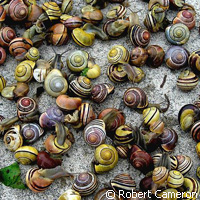Study finds no link between high temps and evolutionary change in snails
Have temperature changes forced creatures to evolve in the last 40 years? A new international research study led by The Open University in the United Kingdom investigated this by getting more than 6 000 people in 15 European countries to observe banded snails in open public spaces and in their gardens. The findings, published in the journal PLoS ONE, suggest that other selective agents, such as predation pressure, are responsible for the change, and how this latest information sets a benchmark for future studies of evolutionary change. The online mass public experiment, called the Evolution MegaLab project and carried out in 2009, focused on bringing the Darwinian Theory to life. Marking the 200th anniversary of Charles Darwin's birth, the project partners digitised over 8 000 historical samples from the British Isles and continental Europe, and made more than 7 600 new observations. The researchers compared data obtained mostly between 1950 and 1990 with the samples collected by the people, which have received personalised interpretations of their observations in their respective languages. Heavy sampling was carried out in the 1960s and 1970s. Scientists postulated that in order to protect themselves from overheating under the Sun, the snail shells would have become lighter. But findings showed that only snails collected in sand dune habitats had lighter shells; this is probably because it is harder for these snails to find shelter and protect themselves from the bright sun. But the evolutionary change observed elsewhere was a surprise; they found a growing number of snails with a single dark spiral band around their shells. While the researchers cannot give a firm reason behind the bandedness, they do not believe it is linked to climate change. According to them, it could either be a result of a drop in bird predation or perhaps a small-scale change in the environment. They say more research is needed to provide greater insight as to why this is going on. 'A known geographic cline in the frequency of the colour phenotype with the highest albedo (yellow) was shown to have persisted and a difference in colour frequency between woodland and more open habitats was confirmed, but there was no general increase in the frequency of yellow shells,' the authors write. 'This may have been because snails adapted to a warming climate through behavioural thermoregulation. By contrast, we detected an unexpected decrease in the frequency of Unbanded shells and an increase in the Mid-banded morph. Neither of these evolutionary changes appears to be a direct response to climate change, indicating that the influence of other selective agents, possibly related to changing predation pressure and habitat change with effects on micro-climate.' Commenting on the study, lead author Professor Jonathan Silvertown, who developed Evolution MegaLab, says: 'This is one of the largest evolutionary studies ever undertaken. Through mass observation we wanted to give the general public, including families and school children, the opportunity to do real science and to experience the fun and excitement of discovery for themselves. Finding unexpected results is what science is all about.' Says Professor Silvertown from the Department of Ecology at the Open University: 'The findings show the power of getting lots of people to help out. These data set a benchmark for future studies of evolutionary change.' The Open University is running several citizen science projects, of which Evolution MegaLab is one. The university kick-started Creative Climate two years ago - a global diary to show how human beings respond to climate change. The general public is encouraged to post a diary; the project is already bearing fruit as it has received hundreds of diary entries from around the globe. Scientists from Austria, Canada, Estonia, France, Germany, Hungary, Italy, Latvia, the Netherlands, Poland, Portugal, Spain, Switzerland and the United Kingdom contributed to this study.For more information, please visit:Evolution Meglab:http://evolutionmegalab.org/The Open University:http://www.open.ac.uk/PLoS ONE:http://www.plosone.org/home.action
Countries
Austria, Canada, Switzerland, Germany, Estonia, Spain, France, Hungary, Italy, Latvia, Netherlands, Poland, Portugal, United Kingdom



